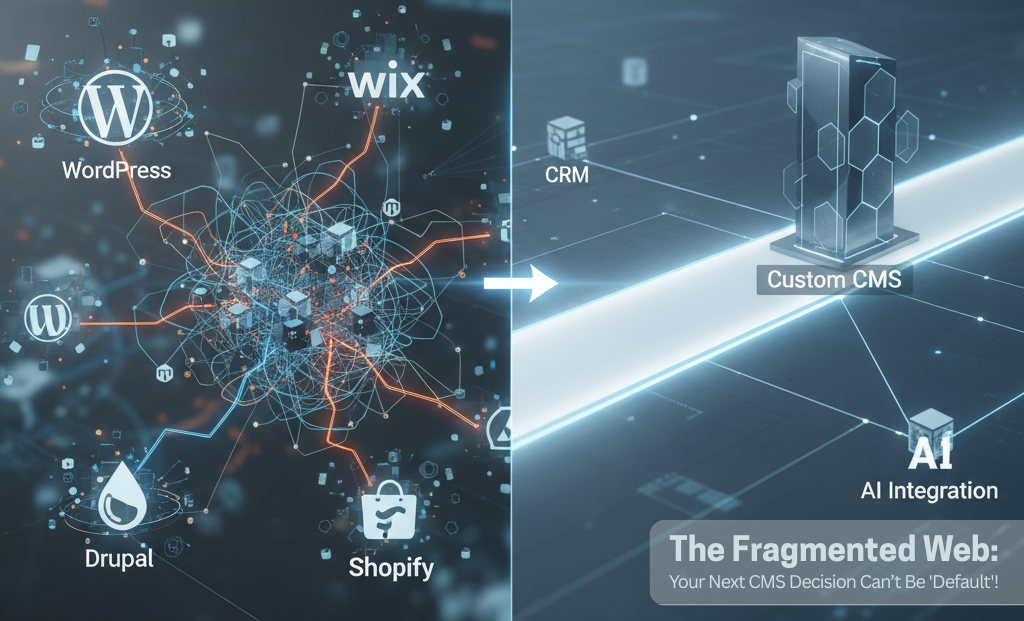
For years, choosing a Content Management System (CMS) for your business felt like a simple choice. There was one clear leader, and most companies simply defaulted to it. However, the internet is changing, and the digital landscape is becoming fragmented.
The recent CMS market share trends tell an important story: the web is no longer dominated by a single platform. The market is splitting between giant open-source systems and user-friendly, managed “website builders.” This major shift means that relying on the “default” choice is now a dangerous business strategy.
Your CMS is the core of your digital operation-it impacts everything from your security and speed to your ability to launch new marketing campaigns or integrate emerging technologies like Artificial Intelligence. Therefore, the decision you make today must be strategic, reliable, and designed for where your business is going, not just where it has been.
At MindLabs Systems, we see this market fragmentation as a clear call for businesses to stop choosing a box and start designing a solution.
Of course, we must begin with WordPress. For a long time, WordPress was the undisputed king of the CMS world, and it still powers a vast number of websites. It is the platform many people think of when they talk about WordPress web development. It’s easy to understand why: it’s free, has a huge community, and offers a plugin for almost any feature you could ever need.
However, the market data shows that its long-standing growth is finally starting to slow down, and in some segments, its share is even sliding. This decline is not accidental; it points to growing challenges that come with massive scale:
To sum up, while WordPress is flexible, achieving true long-term reliability and a tailored fit requires a strategic, expert development approach, not just an installation and a stack of free plugins.
On the other hand, the market has seen explosive growth in simplified, Software-as-a-Service (SaaS) website builders, such as Wix, Squarespace, and specialized platforms like Shopify.
These builders appeal to small businesses and startups for a simple reason: they remove technical overhead. You pay a monthly fee, and they handle the hosting, security, and basic updates. You get an easy, fast start, which is surely attractive.
The major issue, however, is the lack of scalability and control.
These builders create what we call a “walled garden.” Everything works smoothly inside the garden’s walls, but if your business needs something custom-a specialized integration with your CRM, a unique user workflow, or highly complex filtering logic-you will quickly hit a wall.
Therefore, while a website builder offers initial speed, it sacrifices the long-term strategic reliability and flexibility needed for genuine, aggressive business growth.
The fact that the market is fragmenting-with WordPress declining and builders gaining ground-shows that businesses are deeply unhappy with the status quo. They are looking for reliability and fit.
In fact, choosing a new CMS is not an IT problem; it is a fundamental business decision. When considering your next move, you must evaluate the Total Cost of Ownership (TCO), not just the initial cost.
A platform that is “free” or “cheap” now-whether it is a complex, poorly-maintained open-source site or a restrictive SaaS builder-will almost certainly lead to higher costs down the road in the form of:
Reliability isn’t just about the server staying on; it’s about the platform consistently serving your business needs without causing unnecessary complexity or risk.
| No | CMS (as of October 2025) | Launched | Type | Market Share |
| 1 | WordPress | 2003 | Open source | 60.7% |
| 2 | Shopify | 2006 | SaaS | 6.8% |
| 3 | Wix | 2006 | SaaS | 5.7% |
| 4 | Squarespace | 2004 | SaaS | 3.4% |
| 5 | Joomla | 2005 | Open source | 2.0% |
| 6 | Webflow | 2013 | SaaS | 1.2% |
| 7 | Drupal | 2001 | Open source | 1.1% |
| 8 | Tilda | 2014 | SaaS | 1.1% |
| 9 | Adobe Systems | 2013 | Open source | 1.0% |
| 10 | Duda | 2008 | SaaS | 1.0% |
This is where a dedicated, expert technology partner like MindLabs Systems becomes essential.
Instead of trying to force your unique business model into the rigid templates of a website builder, or wrestling with the maintenance demands of a generic open-source installation, we offer a strategic, custom-built solution.
We believe the most reliable platform is one built on a clean, modern architecture, aligned perfectly with your business goals. We specialize in solutions that blend the power of open-source with the reliability of a professionally managed system:
Your next CMS decision should not be based on market share, but on strategic alignment. Before you commit to a platform, ask these four questions:
In the new, fragmented web, the strategic choice is the only reliable choice. Your digital foundation should empower your growth, not limit it. Don’t default to the most popular platform; invest in the one that is professionally designed, custom-built, and future-proofed for your unique business goals.
Contact MindLabs Systems today for a strategic consultation and let us help you build a reliable digital platform that is designed for decades of success, not just for a quick launch.
